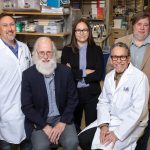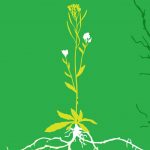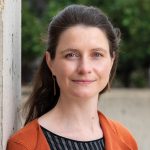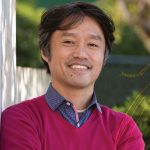What determines how a cell’s genome is regulated to ensure proper growth and development? Turns out, the parts of the genome that are turned on or off in each cell-type or tissue play a major role in this process. Now, Associate Professor Julie Law, first author Ming Zhou and colleagues have shown that the CLASSY gene family regulates which parts of the genome are turned off in a tissue-specific manner. The discovery has the potential to advance many areas in biology, from boosting crop yields in plants to enhancing the efficacy of medical treatments for humans.
Featured Stories
 The Salk Institute and Lustgarten Foundation form strategic pancreatic cancer research partnershipSupported by a $5 million grant, the partnership aims to identify and validate potential targets for new pancreatic cancer drugs. Four participating labs, led by Salk Professors Reuben Shaw, Ronald Evans, Tony Hunter and Assistant Professor Dannielle Engle, will bring their individual areas of complementary expertise to bear on the collaborative goal.
The Salk Institute and Lustgarten Foundation form strategic pancreatic cancer research partnershipSupported by a $5 million grant, the partnership aims to identify and validate potential targets for new pancreatic cancer drugs. Four participating labs, led by Salk Professors Reuben Shaw, Ronald Evans, Tony Hunter and Assistant Professor Dannielle Engle, will bring their individual areas of complementary expertise to bear on the collaborative goal. The weed that changed the worldHow Arabidopsis thaliana became one of the most important tools in science—and how the information the small weed has revealed over decades of research now enables the development of Salk Ideal PlantsTM, a new generation of food crops that are better equipped to both thrive in a changing climate and help mitigate it.
The weed that changed the worldHow Arabidopsis thaliana became one of the most important tools in science—and how the information the small weed has revealed over decades of research now enables the development of Salk Ideal PlantsTM, a new generation of food crops that are better equipped to both thrive in a changing climate and help mitigate it. Courtney Glavis-Bloom — Shining the spotlight on aging to find a cure for Alzheimer’s diseaseSenior Staff Scientist Courtney Glavis-Bloom’s work is driven by her experience caring for her grandparents, who were diagnosed with Alzheimer’s disease when she was in high school. She saw firsthand how dementia robs individuals of their connections to the world—now she studies the brain areas affected in aging in the hope of finding a cure.
Courtney Glavis-Bloom — Shining the spotlight on aging to find a cure for Alzheimer’s diseaseSenior Staff Scientist Courtney Glavis-Bloom’s work is driven by her experience caring for her grandparents, who were diagnosed with Alzheimer’s disease when she was in high school. She saw firsthand how dementia robs individuals of their connections to the world—now she studies the brain areas affected in aging in the hope of finding a cure. Helen McRae — Leveraging the body’s own immune response for more effective cancer therapiesHelen McRae was a graduate student when her cousin was diagnosed with lung cancer and received immunotherapy—an approach that empowers a patient’s own immune system to destroy tumors. McRae saw the promise of this newer treatment, but also how much more research is needed to help it work for more people.
Helen McRae — Leveraging the body’s own immune response for more effective cancer therapiesHelen McRae was a graduate student when her cousin was diagnosed with lung cancer and received immunotherapy—an approach that empowers a patient’s own immune system to destroy tumors. McRae saw the promise of this newer treatment, but also how much more research is needed to help it work for more people. Kenta Asahina – Flying into the future of technology and innovationOriginally from Japan, Associate Professor Kenta Asahina grew up exploring nearby farmlands with his two brothers in search of insects and plants. Their dad enjoyed taking them to the mountains and national parks. These experiences inspired his interest in the natural world, and Asahina now studies how genetics impact fruit fly behavior.
Kenta Asahina – Flying into the future of technology and innovationOriginally from Japan, Associate Professor Kenta Asahina grew up exploring nearby farmlands with his two brothers in search of insects and plants. Their dad enjoyed taking them to the mountains and national parks. These experiences inspired his interest in the natural world, and Asahina now studies how genetics impact fruit fly behavior.






















































